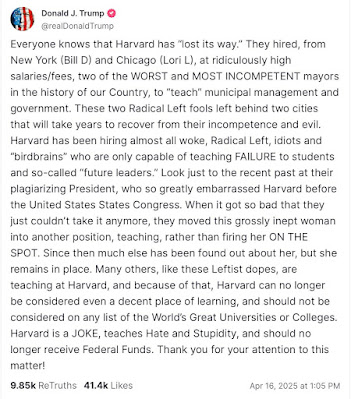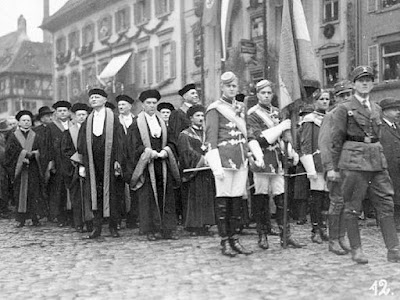Red Baron has blogged about events at the Winterer Forum in the Municipal Theater before, i.e., about a staged production of the negotiations that preceded the Rapallo Treaty, which Reich Chancellor Joseph Wirth and his foreign minister, Dr. Walther Rathenau, negotiated with the Soviet Union.
Another time, it was a fictitious interview with Joseph Wirth on his political positions.

|
| Peter Haug-Lamersdorf and Dr. Ulrike Hörster-Philipps on stage. |
As always, singer
Juliane Hollerbach
excelled with her chansons from the 1920s and 1930s, and Anita Morasch
sang along to her accordion.

|
| Thank you, Juliane, Peter, Ulrike, and Anita, for this memorable morning |
During these years, right-wing extremists murdered Rosa Luxemburg, Karl Liebknecht, and the "fulfilment politician" Matthias Erzberger, so that Wirth also had to fear for his life. The lines of the following hate song were sung to the well-known St. Nicholas tune:
|
Let's be merry and cheerful, Bashing Wirth's head in. Merry, merry trallerallala, Soon, Emperor Wilhelm will return! Once the emperor is back, We'll beat Dr. Wirth to a cripple. The guns will bang, bang, bang On the black and the red pack. Hit Wirth always hard! Knock his skull so hard that it clung! And gun down Walther Rathenau, The goddamned Jewish swine! |
Laßt uns froh und munter sein,
Schlagt dem Wirth den Schädel ein.
Lustig, lustig trallerallala,
Bald ist Wilhelm wieder da!
Wenn einst der Kaiser kommen wird,
Schlagen wir zum Krüppel Dr. Wirth,
Knallen die Gewehre tack, tack, tack
Aufs schwarze und das rote Pack.
Haut immer feste auf den Wirth!
Haut seinen Schädel, daß er klirrt!
Und knallt ab den Walter Rathenau,
Die gottverfluchte Judensau!
|
Ultimately, Wirth had to resign with his first government but soon formed
his second cabinet. He aimed to break the chains of the Treaty of
Versailles. Would a rapprochement with Germany's eastern neighbor, Russia,
which, with its communist regime, saw itself completely isolated from the
rest of Europe, be a solution?. Words of a common destiny between Germany
and Russia began to circulate.
The French Prime Minister Raymond Poincaré took an unbending stance on fulfilling the Versailles provisions. This tough French position was particularly evident at the economic conference in Genoa in 1922, where Germany and Communist Russia were completely isolated.
This led to the rapid signing of the Treaty of Rapallo between the two pariah states, the preliminary draft of which had already been worked out in lengthy negotiations. Wirth and his foreign minister Rathenau thus demonstrated to the world that Germany was free to act, albeit to a limited extent.
In Germany, the right-wing circles were up in arms. In particular, that a Jew, Rathenau, was representing the government of the Reich as foreign minister was a provocation that could no longer be surpassed.
On June 24, 1922, Walther Rathenau, riding in his car, was "executed" with a submachine gun. In a speech to the members of the Reichstag, Wirth turned to the right and exclaimed in despair, "There stands the enemy, dripping his poison into the wounds of our people. - There stands the enemy - and there is no doubt about it: this enemy stands on the right."
After Hitler seized power at the end of January 1933, political parties in Germany were gradually eliminated. The Zentrum dissolved itself, but its politicians were still unsafe from persecution. At the beginning of June, the Freiburg daily Nazi newspaper Der Alemanne reported: "These days, in pursuit of the great purge in Germany, the former Reich Chancellor Dr. Joseph Wirth was to be taken into protective custody. Unfortunately, the bird had already flown. As reported to Switzerland ... This Zentrum leader hardly differed from a Marxist in the words and deeds of his many years of inglorious political activity," yet Wirth was a devout Catholic.
As such, he was well connected with the Vatican and endeavored to have the Church issue a public statement against Germany's anti-Semitic policies.
During the war, Wirth maintained contacts with German resistance groups.
From 1942 onwards, he developed concepts for organizing a democratic Germany
after the end of the war together with exiled social democrats.
The French occupation forces only allowed Wirth to return to Freiburg in 1949, realizing his left-wing political views. After his return, he clashed with Konrad Adenauer, as his policies were western-oriented and cemented Germany's division. Instead, Wirth believed in reviving the Rapallo spirit, so he traveled to Moscow in 1951.
The Federal Republic refused to pay him a pension because of his contacts with the East. The GDR supported Wirth with small grants and awarded him the German Peace Medal in 1954.
Dr. Joseph Wirth died in Freiburg in 1956.
*

























